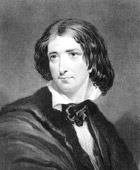Hunt's father was an American clergyman who came to settle in Southgate, Middlesex. Leigh attended Christ's Hospital school in London, and published his first book of poetry, Juvenilia, at the age of seventeen. The following year he set up the weekly Examiner, with his brother John. This was the first of a series of journals he edited, which included the Reflector, Indicator, Companion, Tatler and London Journal. The influence of literary magazines was very strong at this time, and Hunt was responsible for recognising and promoting emerging writers of the calibre of Keats, Shelley and Tennyson.
The popularity of his journalism was not without its drawbacks, however; in 1813 he and his brother were imprisoned for their attacks on the Prince Regent. The two years he spent in jail gained Hunt the reputation of a Liberal martyr, but it also damaged his health. On his release he rejoined a thriving literary society which included Charles Lamb, William Hazlitt and Thomas De Quincey, as well as several great Romantic poets; Shelley was introduced to Keats at Hunt's house.
In 1822 Hunt took his family to Italy, where he planned to start a new journal, The Liberal, in collaboration with Shelley and Byron. Unfortunately the venture was cut short when Shelley was drowned, and Hunt was left in serious financial trouble when Byron departed for Greece in 1824. He returned to England the following year, where he pursued his literary and journalistic career into his late sixties.
Hunt was a key figure in the development of English literature during the Romantic period, both as a writer and an editor. In poetry he turned to the Italians for what he called 'a freer spirit of versification' and the influence of the Elizabethans on his work was also significant. In addition to his own work, he was immortalised by Charles Dickens, in the character of Skimpole in Bleak House. |






